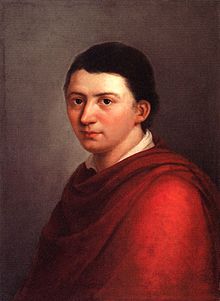Friedrich Schlegel | |
|---|---|
 Friedrich Schlegel in 1801 | |
| Born | 10 March 1772 |
| Died | 12 January 1829 (aged 56) |
| Alma mater | |
| Era | 19th-century philosophy |
| Region | Western philosophy |
| School | |
Main interests | Epistemology, philology, philosophy of history |
Notable ideas |
|
Karl Wilhelm Friedrich (after 1814: von) Schlegel (/ˈʃleɪɡəl/ SHLAY-gəl;[7] German: [ˈfʁiːdʁɪç ˈʃleːɡl̩]; 10 March 1772 – 12 January 1829) was a German poet, literary critic, philosopher, philologist, and Indologist. With his older brother, August Wilhelm Schlegel, he was one of the main figures of Jena Romanticism.
Born into a fervently Protestant family, Schlegel rejected religion as a young man in favor of atheism and individualism. He entered university to study law but instead focused on classical literature. He began a career as a writer and lecturer, and founded journals such as Athenaeum. In 1808, Schlegel returned to Christianity as a married man with both him and his wife being baptized into the Catholic Church. This conversion ultimately led to his estrangement from family and old friends. He moved to Austria in 1809, where he became a diplomat and journalist in service of Klemens von Metternich, the Foreign Minister of the Austrian Empire. Schlegel died in 1829, at the age of 56.[8]
Schlegel was a promoter of the Romantic movement and inspired Samuel Taylor Coleridge, Adam Mickiewicz and Kazimierz Brodziński. The first to notice what became known as Grimm's law, Schlegel was a pioneer in Indo-European studies, comparative linguistics, and morphological typology, publishing in 1819 the first theory linking the Indo-Iranian and German languages under the Aryan group.[9][10] Some of his works were set to music by Schubert, Mendelssohn and Schumann.
- ^ Frederick C. Beiser, German Idealism: The Struggle Against Subjectivism, 1781–1801, Harvard University Press, 2002, p. 349.
- ^ a b Asko Nivala, The Romantic Idea of the Golden Age in Friedrich Schlegel's Philosophy of History, Routledge, 2017, p. 23.
- ^ Elizabeth Millan, Friedrich Schlegel and the Emergence of Romantic Philosophy, SUNY Press, 2012, p. 49.
- ^ a b Brian Leiter, Michael Rosen (eds.), The Oxford Handbook of Continental Philosophy, Oxford University Press, 2007, p. 175: "[The word 'historicism'] appears as early as the late eighteenth century in the writings of the German romantics, who used it in a neutral sense. In 1797 Friedrich Schlegel used 'historicism' to refer to a philosophy that stresses the importance of history ..."; Katherine Harloe, Neville Morley (eds.), Thucydides and the Modern World: Reception, Reinterpretation and Influence from the Renaissance to the Present, Cambridge University Press, 2012, p. 81: "Already in Friedrich Schlegel's Fragments about Poetry and Literature (a collection of notes attributed to 1797), the word Historismus occurs five times."
- ^ Angela Esterhammer (ed.), Romantic Poetry, Volume 7, John Benjamins Publishing, 2002, p. 491.
- ^ Michael N. Forster, Kristin Gjesdal (eds.), The Oxford Handbook of German Philosophy in the Nineteenth Century, Oxford University Press, 2015, p. 81.
- ^ Wells, John C. (2008), Longman Pronunciation Dictionary (3rd ed.), Longman, ISBN 9781405881180
- ^ Speight (, Allen 2007). "Friedrich Schlegel". In Zalta, Edward N. (ed.). Stanford Encyclopedia of Philosophy.
{{cite encyclopedia}}: CS1 maint: numeric names: authors list (link). - ^ Watkins, Calvert (2000), "Aryan", American Heritage Dictionary of the English Language (4th ed.), New York: Houghton Mifflin, ISBN 0-395-82517-2,
...when Friedrich Schlegel, a German scholar who was an important early Indo-Europeanist, came up with a theory that linked the Indo-Iranian words with the German word Ehre, 'honor', and older Germanic names containing the element ario-, such as the Swiss [sic] warrior Ariovistus who was written about by Julius Caesar. Schlegel theorized that far from being just a designation of the Indo-Iranians, the word *arya- had in fact been what the Indo-Europeans called themselves, meaning [according to Schlegel] something like 'the honorable people.' (This theory has since been called into question.)
- ^ Schlegel, Friedrich. 1819. Review of J. G. Rhode, Über den Anfang unserer Geschichte und die letzte Revolution der Erde, Breslau, 1819. Jahrbücher der Literatur VIII: 413ff